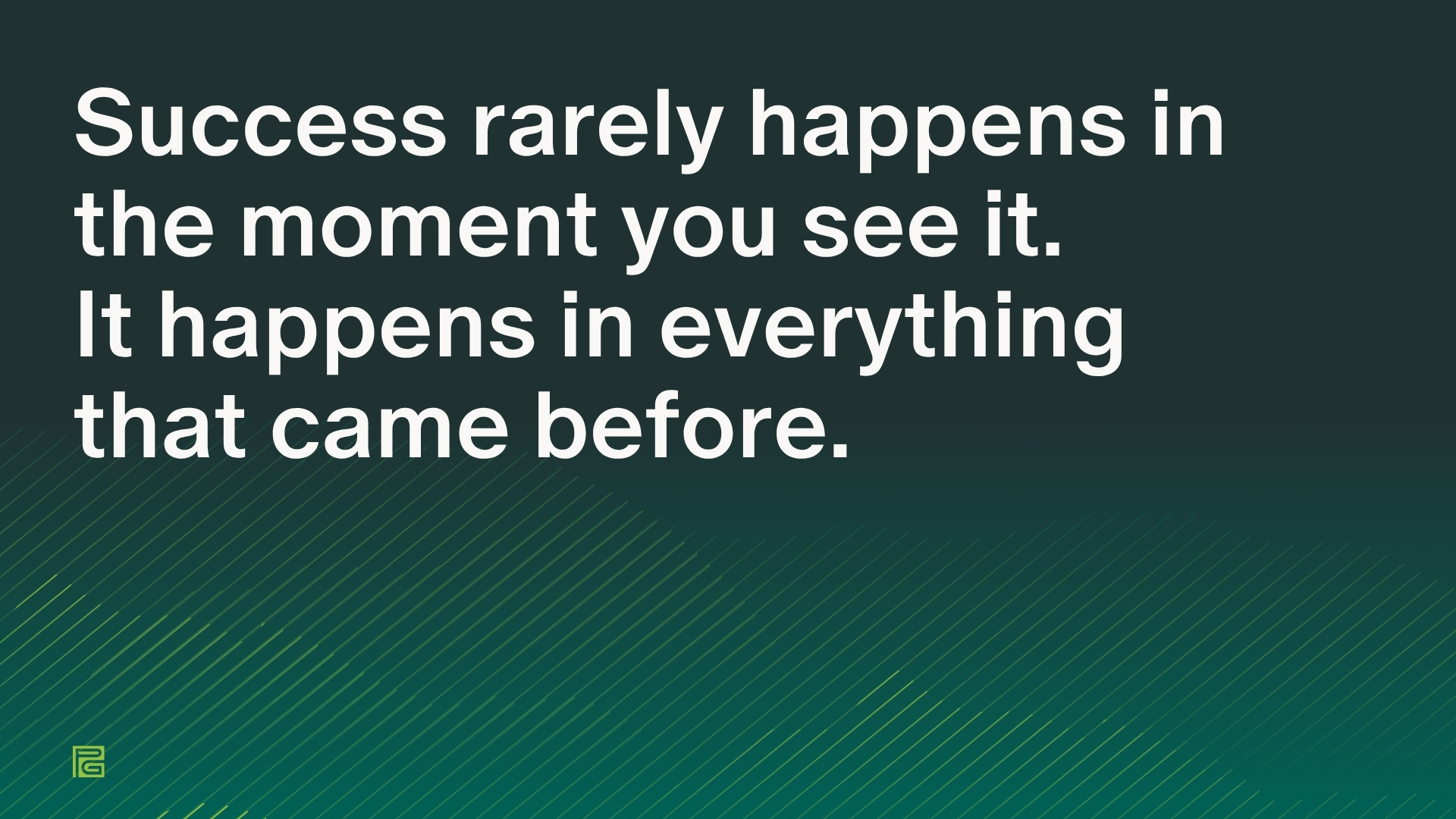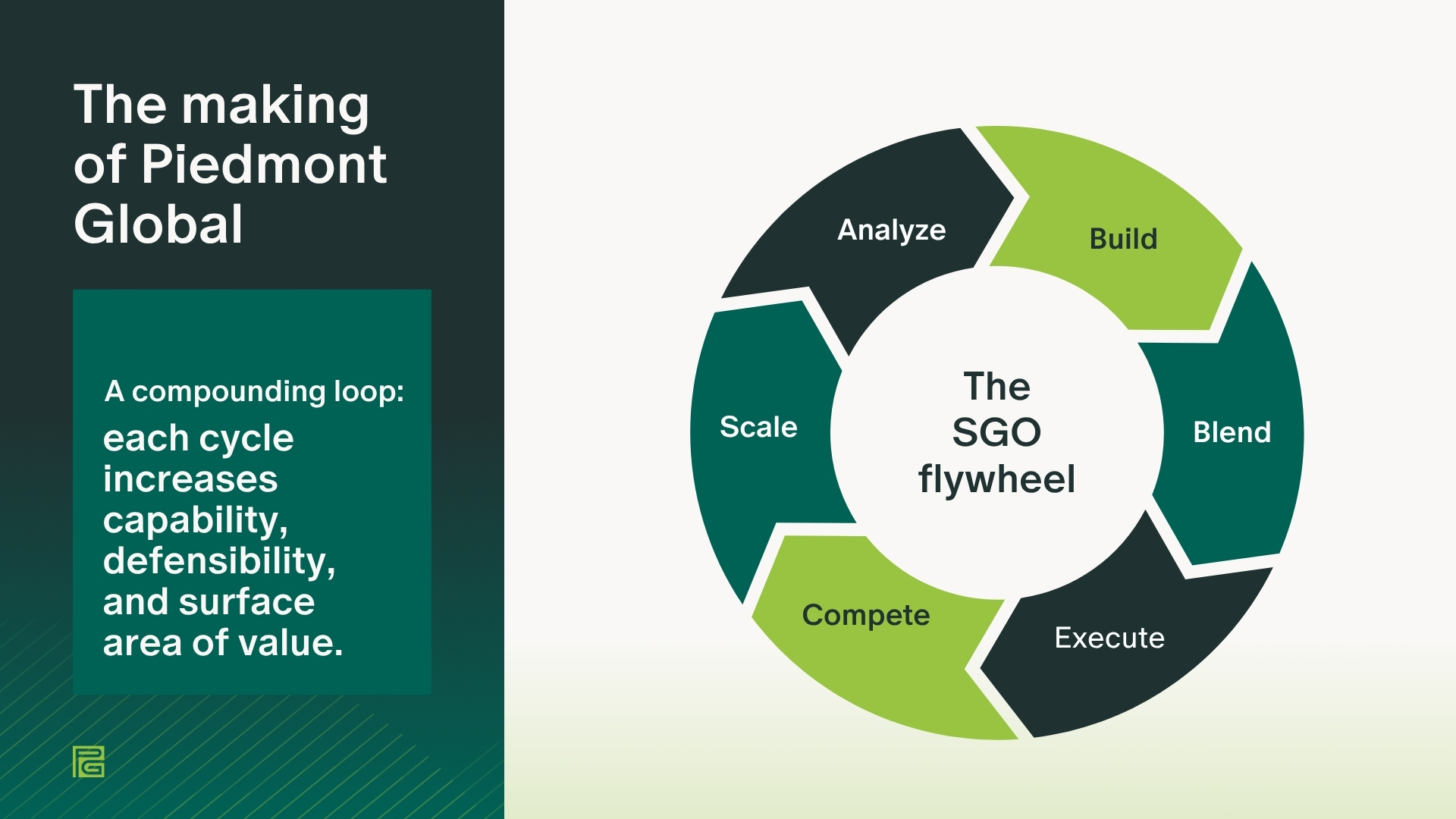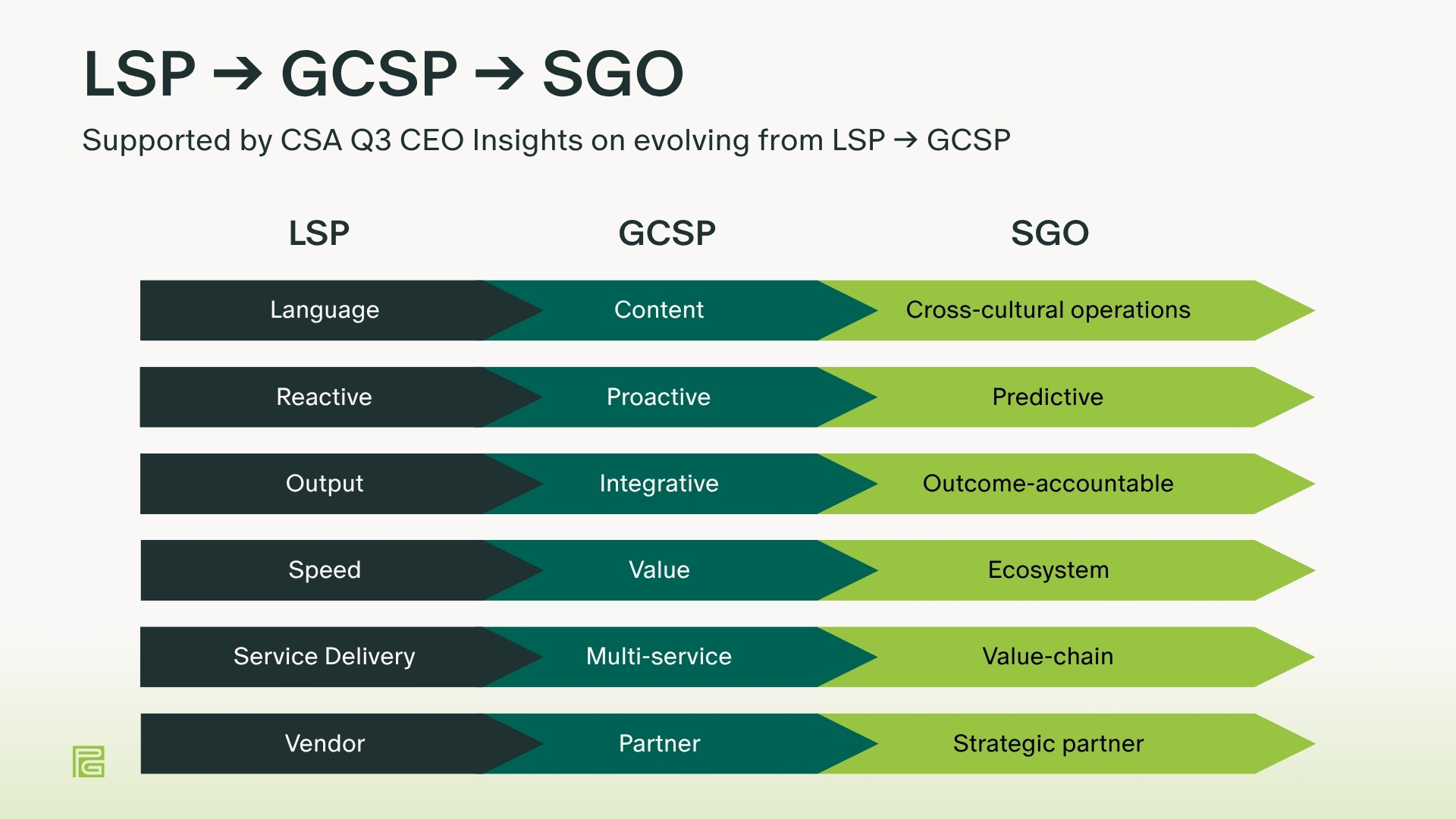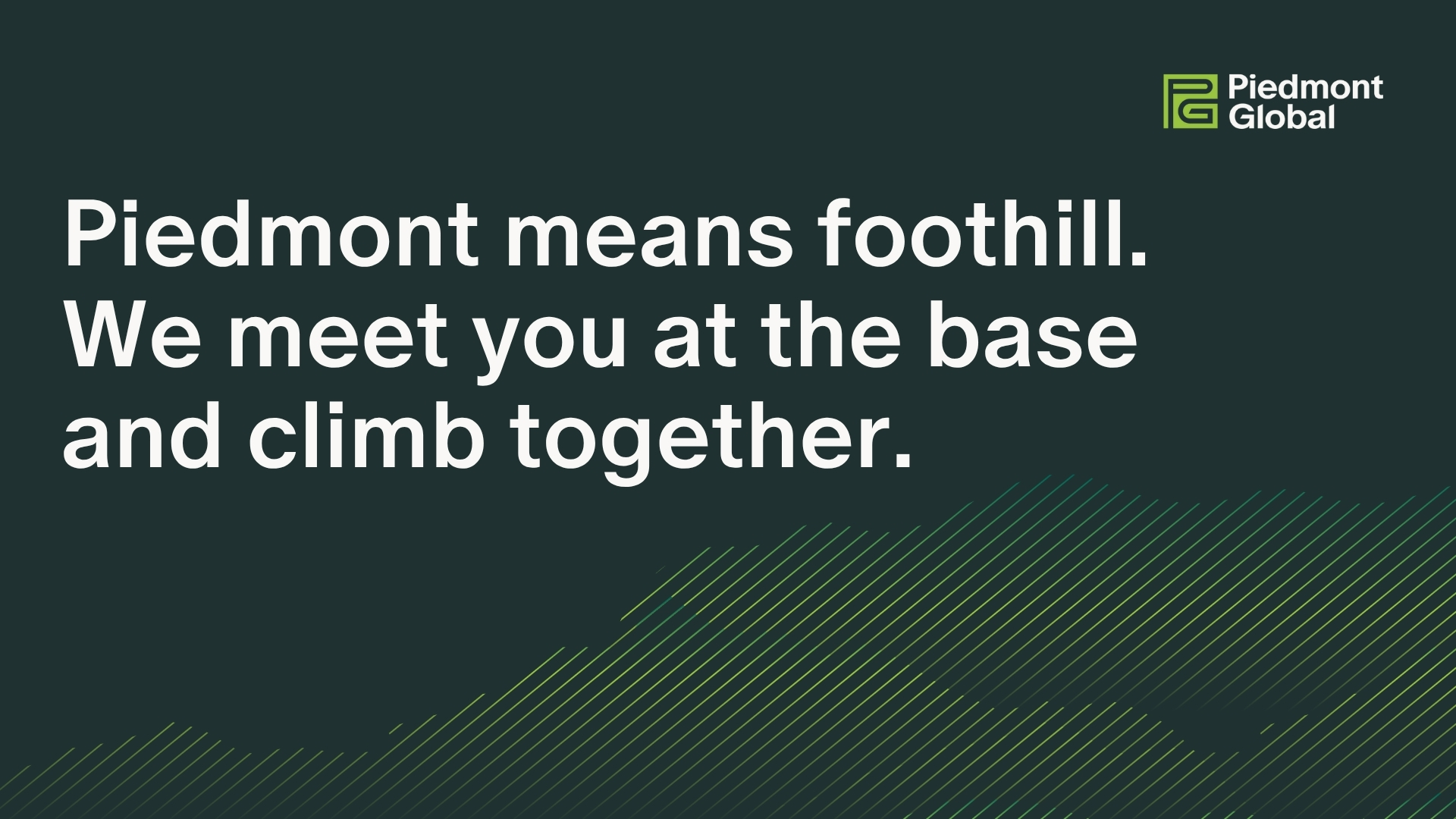Originally presented at CSA Research 2025
The moment behind the moment
Success rarely happens in the moment you see it. It happens in everything that came before. When you see a company rebrand, a new category announcement, or a market breakthrough, it looks like a single defining moment. But behind that moment are years of invisible work — reflection, risk, reinvention, and resolve.
At Piedmont Global, that work began with a single realization: we could no longer grow by doing more of the same.
The industry we inherited was a $50 billion marketplace of language and content providers — all chasing the same contracts, competing on speed and price. To lead beyond that ceiling, we had to redefine what business we were in.
We stopped asking, “How fast can we deliver?” and started asking, “How far can this scale?”
From vendor to operator
That mindset shift expanded not just our capabilities, but the very market we serve. When you operate as a Strategic Globalization Organization (SGO), you step beyond translation and content into adjacent, higher-value domains — consulting, accessibility, staffing, data, open-source intelligence, and operations.
The total addressable market doesn’t stop at $50 billion anymore. It’s north of a trillion. That’s the difference between a vendor and an operator of global systems.
Strategic Globalization isn’t about what you sell. It’s about what you enable — growth, connection, and clarity across borders, languages, and cultures.
The forks in the road
Every founder faces a few critical decisions:
- Stay a vendor or become a partner?
- Compete on price or redefine value?
- Chase logos or build proof?
We chose the harder path — to influence upstream strategy before fulfilling downstream needs. To be a lighthouse, not a land grab. To build proof before we asked for praise.
That conviction shaped our core belief: ecosystems over isolated nodes, judgment over automation, partnership over provision. Our edge isn’t any single tool or service. It’s how we assemble the right solution for every context — a system that learns, scales, and lasts.
Rebrand ≠ marketing. It’s infrastructure.
When we decided to rebrand as Piedmont Global, it wasn’t cosmetic — it was architectural. We rebuilt how we think, hire, deliver, measure, and govern.
We didn’t rename the company. We re-engineered it.
The transformation took nearly two years and started with a simple question: “What would it look like if our brand reflected the way our clients already experienced us — embedded, strategic, aligned?”
The answer was a new model: the Strategic Globalization Organization.
The SGO flywheel
At the center of our operating model is a compounding loop — the SGO Flywheel:
Acquire → Build → Expand → Execute → Compete → Analyze → Repeat
Each cycle increases capability, defensibility, and the surface area of value. It’s how we keep climbing — iteration over perfection. This rhythm ensures that every investment strengthens the next, every lesson builds resilience, and every outcome sharpens the system. SGOs are not static; they are self-improving organisms.
Risks and rewards
Redefining a category comes with trade-offs:
- You’ll be misunderstood before you’re respected.
- You’ll face resistance before alignment.
- You’ll trade short-term comfort for long-term clarity.
That’s the tax on originality — and it’s worth paying. Because when you stay disciplined and let your lighthouse speak, the market eventually catches up. Durable growth follows durable conviction.
The SGO mindset
Becoming an SGO is as much a mindset as it is a model.
It requires:
- Risk appetite to step where others haven’t
- Independence to make hard calls
- Curiosity to explore new disciplines
- Resilience to climb again when it gets steep
- Vision that outpaces fear
- Structure that scales complexity
- Courage to rewrite your own rules
As I often say, AI won’t kill our industry — complacency will. The future belongs to those who integrate across culture, data, and human judgment — the ones conducting the orchestra, not singing in the background.
From LSP to SGO: the evolution of an industry
Strategic Globalization is the next logical evolution — from translating words to orchestrating systems that drive outcomes across borders. We don’t just help organizations speak globally. We help them operate globally.
Proof before praise
When we began, there was no blueprint. No one was asking for an SGO. But conviction has to come before validation. We built the model before the market believed in it — because legacy is earned through measurable impact, not invoices. Leadership isn’t about waiting for recognition. It’s about proving what’s possible, then inviting others to climb with you.
The climb ahead
Piedmont means foothill — the place every climb begins. Strategic Globalization isn’t a destination; it’s a discipline. You climb, rest, build, and climb again. That’s how SGOs — and new categories — are made.
How to start building your own SGO
If you’re a leader wondering how to begin, start here:
- Start with purpose — not product. Know why you exist before deciding what you sell.
- Move upstream. Get closer to client strategy, not just service delivery.
- Design ecosystems — not transactions. Solve for the entire value chain.
- Build for resilience. Systems, people, and values that flex and endure.
- Keep climbing. Reinvention isn’t a campaign; it’s a habit.
The future belongs to those who create it. And the next era of cross-cultural operations is already underway.
About Piedmont Global
Piedmont Global is the world’s first Strategic Globalization Organization (SGO) — helping enterprises communicate with intelligence, scale with intention, and operate with cultural fluency. We integrate human expertise, technology, and strategic insight to make cross-cultural operations smarter, easier, and more human.
→ Learn more about the SGO Model and how we’re shaping the future of global operations.






